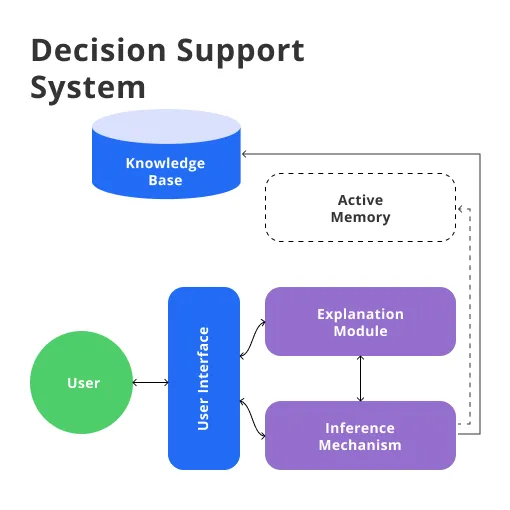What is a Decision Support System?
A Decision Support System (DSS) is a computerized information system that facilitates complex decision-making activities by gathering, interpreting, and analyzing essential data.
It ensures that decision-makers are empowered with comprehensive, data-driven insights to make strategic decisions.
The primary rationale underpinning the development of DSS is the facilitation of complex decision-making processes. It acknowledges the inadequacy of intuition and guesswork in deriving conclusions and instead promotes a structured, methodical approach based on data interpretation.
The DSS framework is characterized by its decision-making capability, flexible interaction, information accessibility, situational modeling, and user-friendliness.
Each of these traits enhances the ability of the 3 DSS to manage, manipulate, and interpret data with efficiency.
Components of a Decision Support System
A Decision Support System (DSS) is composed of several integral components that work together to enhance decision-making processes. These include the following:
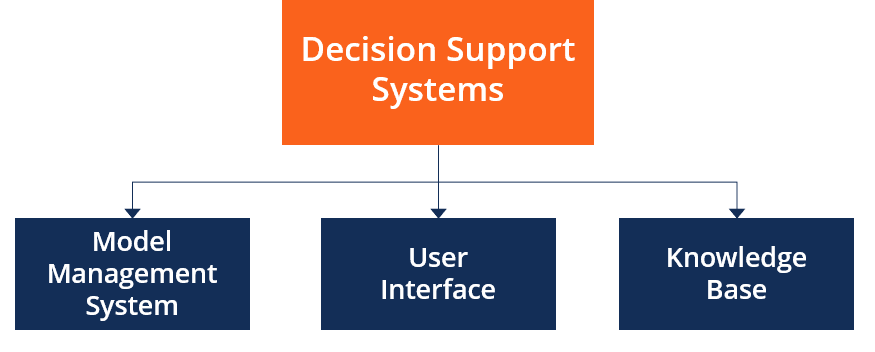
Database Management System (DBMS)
Positioned at the heart of a DSS, the Database Management System (DBMS) consists of collections of related data designed to meet the informational requirements of an organization.
By enabling data access, retrieval, and update, the DBMS enhances the DSS's functionality.
Model Management System
The model management system handles diverse decision models within the DSS.
By providing insights into static, dynamic, theoretical, or empirical models that simulate business processes or systems, it adds depth to the decision-making process.
User Interface
Serving as a gateway between decision-makers and the DSS, this component is designed to ensure user-friendly, intuitive, and flexible interaction between the user and the system.
Knowledge Base
The knowledge base supplements traditional data with subjective insights, decision-making logic, and procedural knowledge. It serves as the repository from which solutions to complex problems are derived.
3 Types of Decision Support System
Decision Support Systems (DSS) are designed to assist in decision-making by analyzing large data sets and providing insights. There are 3 DSS that serve various decision-making needs:
1. Model-Driven DSS
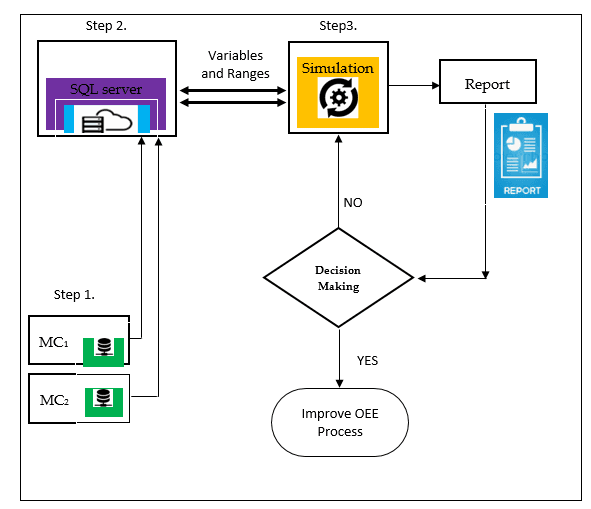
Model-driven DSS relies heavily on mathematical and analytical models to support decision-making.
This type of out of the 3 DSS is useful for solving complex problems where predefined models can be applied, such as financial analysis, risk assessment, and logistics planning.
Model-driven systems do not rely as much on large data sets but instead use structured techniques to analyze variables and outcomes.
They help in forecasting, optimization, and simulation by using specific models like linear programming, decision trees, and what-if analysis.
2. Data-Driven DSS
Data-driven DSS is one of the 3 DSS that focuses on accessing, processing, and analyzing large volumes of structured data. These systems are ideal for decisions that rely on historical data and require real-time analysis.
Data-driven systems are common in business intelligence and data warehousing applications, where they help generate reports, trends, and summaries. Tools such as OLAP (Online Analytical Processing) and data mining techniques are commonly used.
Data-driven DSS is valuable for operational decision-making in fields like sales forecasting, inventory management, and customer segmentation.
3. Knowledge-Driven DSS
Knowledge-driven DSS, also known as Expert Systems of the 3 DSS, focuses on leveraging expertise and specific domain knowledge to aid decision-making.
These systems use knowledge bases, which store detailed rules and expert information, to provide advice or recommendations.
Knowledge-driven DSS are beneficial in fields like medical diagnosis, troubleshooting, and technical support, where decisions require specialized knowledge.
Knowledge-driven DSS often employ artificial intelligence (AI) techniques, such as machine learning and natural language processing, to mimic human expertise.
Applications of Decision Support System
Decision Support System (DSS) have become essential tools across various sectors by offering data-driven insights and analytical support.
Here are some key applications of DSS in diverse fields:
Business and Management
Decision Support System (DSS) are widely used in business environments to aid managers in making informed decisions.
By integrating data from various sources, DSS helps in analyzing and predicting business outcomes. This enables better strategic decisions, such as market expansion or product diversification.
Healthcare Decision-Making
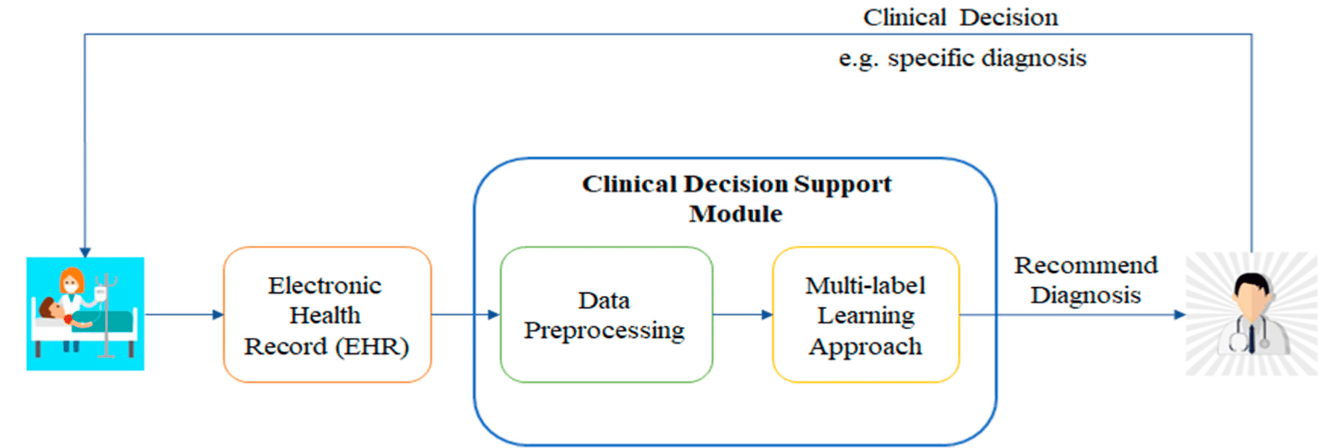
In healthcare, DSS assists medical professionals in diagnosing diseases, recommending treatments, and managing patient care.
By evaluating medical data, a DSS can help determine the most appropriate course of action for a patient, improving treatment outcomes and efficiency.
Supply Chain Management
DSS plays a crucial role in optimizing supply chain operations. By analyzing real-time data on inventory levels, transportation, and demand forecasts, a DSS can help companies streamline logistics, reduce costs, and improve the overall efficiency of their supply chain.
Financial Planning and Analysis
In the finance sector, DSS supports investment decisions, portfolio management, and risk assessment.
These systems enable financial analysts to assess market trends, model financial outcomes, and guide investments for maximizing returns and minimizing risks.
Environmental and Urban Planning
DSS is applied in environmental management and urban planning to evaluate the impact of policies, manage resources, and design sustainable development strategies.
They assist in balancing economic, social, and environmental factors for optimal decision-making.
Advantages of Decision Support System
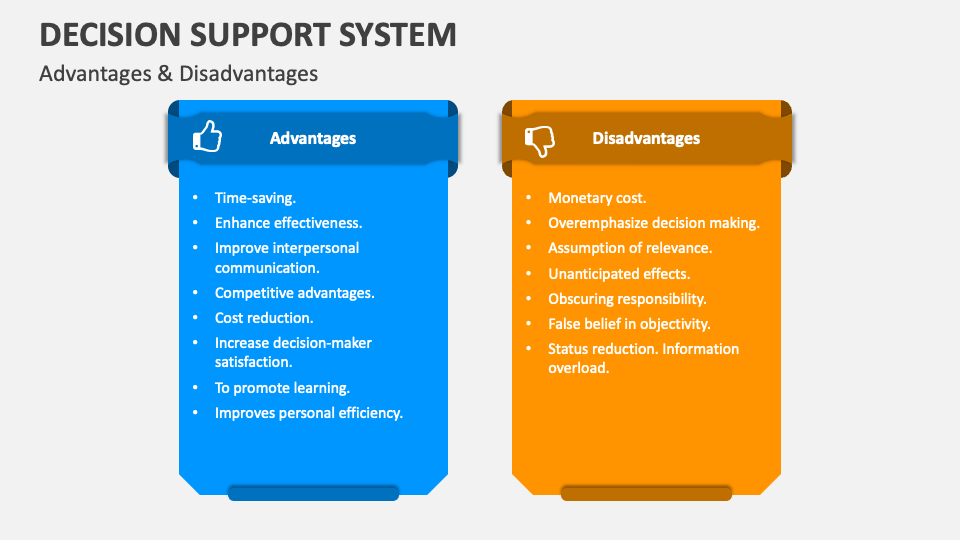
Decision Support System (DSS) play a crucial role in modern organizations. Here are some key advantages of implementing DSS in decision-making environments:
- Enhanced Decision-Making Speed: DSSs enable faster decisions by providing real-time data analysis. The speed with which 3 DSS (data-driven, model-driven, and communication-driven) systems process information helps users make quick, well-informed decisions, especially in dynamic and competitive environments.
- Improved Decision Quality: DSS tools integrate large volumes of data with analytical models, supporting decision-makers in evaluating alternatives comprehensively.
With a model-driven DSS, for example, users can predict potential outcomes, leading to more accurate and higher-quality decisions.
- Increased Efficiency and Productivity: By automating parts of the decision-making process, DSS reduces the time and effort required to analyze data, thus increasing operational efficiency. This is especially true for data-driven DSS, which rapidly processes extensive datasets to provide insights.
- Support for Complex Problem Solving: DSS can handle multi-dimensional problems by allowing users to simulate various scenarios, making them valuable for complex decision-making processes. Communication-driven DSS also enables team collaboration, facilitating the resolution of complex issues.
Challenges of Implementing Decision Support System
Implementing a Decision Support System (DSS) can enhance organizational decision-making, but it also presents several challenges that must be addressed for successful integration and effective use.
Technical Complexity
Implementing a Decision Support System (DSS) can be technically challenging. Integrating a DSS with existing systems, handling large datasets, and developing accurate algorithms require significant expertise in IT infrastructure and data management.
Without proper resources and skilled professionals, this complexity can hinder effective DSS deployment.
Data Quality and Availability
The effectiveness of a DSS relies on accurate, high-quality data. Poor data quality, data silos, and inconsistent data formats can disrupt decision-making processes and compromise the DSS's reliability.
Ensuring that data is clean, timely, and comprehensive is crucial for producing valuable insights.
User Resistance and Training Needs
Employees may resist adopting a DSS due to fear of job replacement or unfamiliarity with new technologies.
Training and support are essential to address this challenge, helping users feel confident in using the DSS effectively. A well-trained workforce can improve user acceptance and system utility.
High Implementation Costs
Developing, implementing, and maintaining a DSS can be costly. Expenses include software development, hardware upgrades, data acquisition, and staff training.
High costs may limit DSS adoption, especially for smaller organizations with limited budgets.
Security and Privacy Concerns
DSS systems often handle sensitive and confidential data, making them susceptible to data breaches and cyberattacks.
Implementing robust security protocols is essential to protect decision-support data, ensuring both privacy and data integrity in the decision-making process.
Best Practices for Decision Support System (DSS)
A Decision support system (DSS) aids in processing and analyzing data, making it valuable for handling complex decisions in various industries.
Best practices for implementing an effective DSS include:
- Identifying Decision Needs: Before implementing a DSS, it’s crucial to understand the specific decision needs of the organization.
This ensures the system is tailored to provide relevant insights that align with the decision-maker’s goals.
- Data Quality and Integration: Ensuring high-quality, integrated data sources is essential. A DSS relies on accurate and timely data, so maintaining clean, complete, and up-to-date datasets allows for reliable decision outputs.
- User-Friendly Interface: A well-designed DSS should prioritize usability, making it accessible for non-technical users.
This minimizes resistance and enhances decision-makers interaction with the system, ensuring they can easily interpret data and apply insights.
- Continuous Evaluation and Feedback: Regularly evaluate the DSS’s effectiveness and incorporate user feedback to improve system accuracy and functionality.
This iterative process helps keep the DSS aligned with evolving decision needs and technological advances.
- Training and Support: Equipping users with training ensures they understand how to interpret DSS outputs effectively. It leads to better-informed decisions.
Frequently Asked Questions (FAQs)
How does a Decision Support System (DSS) help businesses?
A Decision support system (DSS) helps businesses by providing data analysis, modeling, and simulation capabilities to support decision-making and maximize efficiency.
What Decision Support System (DSS) consist of?
A Decision support system (DSS) typically consists of a database, models or algorithms, a user interface, and decision-making tools to aid in collecting and analyzing data.
How can a Decision Support System (DSS) improve decision-making processes?
A Decision support system (DSS) can improve decision-making processes by providing timely and accurate data analysis, allowing for better insights and more informed decisions.
Where are Decision Support System (DSS) commonly used?
Decision support system (DSS) is commonly used in industries such as finance, healthcare, logistics, and manufacturing for tasks like financial forecasting, inventory management, and resource allocation.
Can a Decision Support System (DSS) integrate with other systems?
A Decision support system (DSS) can integrate with other systems such as enterprise resource planning (ERP) systems or customer relationship management (CRM) systems to leverage data from multiple sources.
